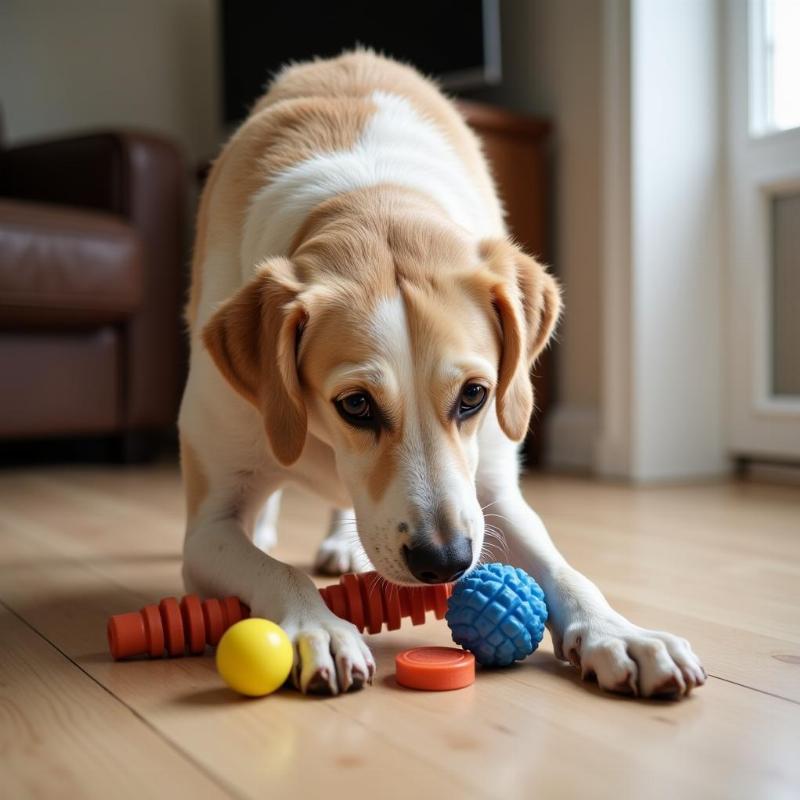Caring for a senior dog can be incredibly rewarding, but it can also present unique challenges, especially when canine cognitive dysfunction (CCD), often referred to as dog dementia, enters the picture. If your search brought you here because your dog with dementia is driving you crazy, you’re not alone. Many pet parents experience similar frustrations and anxieties. This article will provide practical advice, compassionate insights, and resources to help you navigate this difficult time and ensure your beloved companion enjoys their golden years with comfort and dignity.
Understanding Canine Cognitive Dysfunction (CCD)
Just like humans, dogs can experience cognitive decline as they age. CCD affects a dog’s memory, learning, perception, and awareness. Common symptoms include disorientation, changes in sleep patterns, house soiling accidents, anxiety, and altered social interactions. If your furry friend seems confused, paces anxiously, or forgets familiar routines, CCD might be a factor.
Practical Tips for Managing a Dog with Dementia
Living with a dog with dementia requires patience, understanding, and a few adjustments to your routine. Here are some practical tips to help ease your frustration and improve your dog’s quality of life:
-
Maintain a Consistent Routine: Predictability is key for dogs with CCD. Stick to regular feeding times, walks, and play sessions. A consistent routine can minimize anxiety and confusion.
-
Create a Safe and Comfortable Environment: Minimize potential hazards in your home, such as loose rugs or electrical cords. Provide a comfortable bed in a quiet, familiar area.
-
Enrichment Activities: Engage your dog in simple, stimulating activities like puzzle toys, short walks, or gentle grooming sessions. These activities can help maintain cognitive function and reduce boredom.
 Senior Dog Playing with Puzzle Toys
Senior Dog Playing with Puzzle Toys
-
House Soiling Management: Accidents are common with CCD. Establish a regular potty break schedule and be patient with your dog. Consider using enzyme cleaners to eliminate odors and discourage repeat accidents.
-
Dietary Adjustments: Consult your veterinarian about specialized diets formulated for senior dogs with cognitive decline. These diets often contain antioxidants and other nutrients that can support brain health.
-
Medication: While there’s no cure for CCD, your vet might recommend medications to manage specific symptoms like anxiety or sleep disturbances.
Communicating with Your Senior Dog
While your dog’s cognitive abilities might be declining, they still need your love and reassurance. Speak to them in a calm, soothing voice. Use simple commands and gestures. Maintain physical contact through gentle petting and cuddling.
Seeking Professional Help
Don’t hesitate to reach out to your veterinarian for guidance. They can diagnose CCD, rule out other medical conditions, and recommend appropriate management strategies. They can also connect you with resources and support groups.
Coping with the Emotional Challenges
Caring for a dog with dementia can be emotionally draining. Remember to prioritize your own well-being. Connect with other pet parents who understand your challenges. Don’t hesitate to seek support from friends, family, or a therapist.
Conclusion
Dealing with a dog with dementia is undoubtedly challenging, but by understanding the condition, implementing practical strategies, and seeking professional support, you can help your beloved companion live their remaining years with comfort, dignity, and love. Remember, patience, understanding, and a consistent routine are key to navigating this journey together. Don’t hesitate to reach out for help and support – you don’t have to face this alone.
FAQ
-
How do I know if my dog has dementia? Changes in behavior, such as disorientation, anxiety, house soiling, and altered sleep patterns, can indicate dementia. Consult your veterinarian for a diagnosis.
-
Is there a cure for dog dementia? Unfortunately, there is no cure for CCD. However, medication and lifestyle adjustments can help manage symptoms.
-
What can I do to make my dog more comfortable? Maintain a consistent routine, create a safe environment, and provide enrichment activities.
-
How do I deal with house soiling accidents? Establish a regular potty break schedule and use enzyme cleaners to eliminate odors.
-
When should I seek professional help? If you notice any signs of cognitive decline, consult your veterinarian immediately.
Beautdogs.us: Your Trusted Source for Dog Care
Beautdogs.us is a leading dog lifestyle website in the US, offering comprehensive and reliable information on all aspects of dog care. Our expert team provides authoritative yet accessible content on dog breeds, health, training, and products. Whether you’re a new dog owner or a seasoned pro, Beautdogs.us is your trusted source for everything dog-related. Contact us for expert advice and support: Email: [email protected], Phone: +1 501-555-7529.